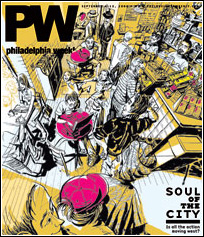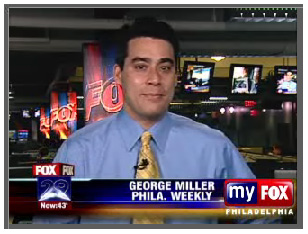Too Close for Comfort
Must "relationships" always lead to corruption in Philly politics?
From the May 16, 2007 Philadelphia Weekly
Mayor John Street exits the R3 regional rail car at Market East Station with a gaggle of reporters and cameras following him. The late morning ride was a PR stunt to highlight the need for dedicated public transit funding, but the reporters are tailing the mayor not because they care about SEPTA.
Another controversy has arisen.
Attack ads targeting Michael Nutter have popped up from a 527 political action committee. Street made fundraising calls on behalf of the organization at the request of Shawn Fordham, his former campaign manager, who is consulting for the 527.
Street was probably legally allowed to make the calls, but his actions signify the mayor's efforts to influence the race to elect his successor. It appears that Street is trying to help bring down Nutter, possibly in favor of Street's old pal Chaka Fattah.
"I will talk about that at another time," Street snaps at reporters who follow him through the concourse.
"Did you raise money for this anti-Nutter 527?" a reporter asks.
"I will talk to you about all that at another time," the mayor reiterates.
"Now is as good as any," the reporter offers. "We're all here."
"Later would be better," Street responds.
And after another reporter pushes again, the mayor announces, "I actually prefer to talk about things when it's convenient for me."
Then he walks away, not to be seen in public for the rest of the day.
***
Behind-the-scenes dealings are regular political occurrences, but when they're connected to Street, they attract even more attention.
Ever since an FBI bugging device was discovered in Street's City Hall office in 2003, there's been greater focus on cleaning municipal politics of corruption. Street was never considered a target of investigation, but several associates were convicted in pay-to-play scandals, ethics laws were drafted, government watchdogs were reenergized, and "reform" became the buzzword in this year's mayoral race.
"When people talk about reform in Philadelphia, for the most part what they're saying is there's too much inside baseball," says Donald Kettl, director of the Fels Institute of Government at the University of Pennsylvania. "There's too much of the game being run for the players and not enough for the citizens as a whole."
The perception is that deals are done for the benefit of allies, not for the benefit of the city at large, he says.
"The political machinery isn't solving the problems we're facing: crime, schools, transit," says Jethro Heiko, founder of Casino-Free Philadelphia. "They're not beholden to the constituency. They're beholden to special interests and developers."
According to a March study from the Institute for Public Affairs at Temple University, Heiko isn't alone in his skepticism. Of those polled, 71 percent believe city government is "pretty much run by a few big interests looking out for themselves." Forty-two percent of the responders believe "quite a few of the people running city government are corrupt."
"There seems to be public agitation, a feeling that things ought to change," says Michael Hagen, director of the Institute. "Can the city operate without politicking? That's the $64,000 question."
***
Philadelphia's well-oiled political machinery has been operating for half a century, and bringing about change would be like asking people to stop booing Pat Burrell or to stop double-parking in South Philly. Making deals, peddling influence and taking care of friends is a birthright here. It's as much a part of our culture as putting tough guys in makeup and shiny dresses, and letting them prance up Broad Street every New Year's Day.
"In Philadelphia, relationships really matter," says Zack Stalberg, president of the good-government group Committee of Seventy. "You're never going to take it out of the equation."
Effective politicians have to be able to make compromises to accomplish their goals, he says. Trading support for projects and taking advantage of relationships is how things get done.
"It's always a part of the way humans deal with each other," he says. "But not everything should be a deal."
Stalberg thinks citizens have seen too many shady backroom transactions in recent years, and that they've reached a breaking point.
"The electorate is angry," he says.
And he isn't talking about just the mayor's race. He cites the Democratic takeover of Congress as proof of citizens' rage at the president and the war in Iraq. In Pennsylvania voters turned away politicians who tried to give themselves substantial pay raises. And there was a whole host of candidates for City Council who labeled themselves reformers after recognizing residents' disgust with the current government.
"It might be the beginning of a cycle of change," Stalberg says. "We may be on the road to a better political culture."
While the campaign of millionaire Tom Knox made money a major factor in the primary run, Brett Mandel, director of the government reform advocacy group Philadelphia Forward, says reform and anticorruption dominated the race.
"You have to be very excited," he says. "The two candidates who were talking about change were on top of the race."
The longstanding traditions of patronage, nepotism and cronyism - as well as plain old greed - have restrained the city for too long, experts agree.
"I think Philadelphia is a place that's underperforming its capacity," says Penn's Kettl. "It's possible for the city to be more than it is. It's possible for the city to rise to levels that haven't been reached."
***
Fordham, who claims responsibility for making the public believe the 2003 bugging scandal was directed by Rick Santorum and the Bush administration, says Mayor Street made the fundraising calls as a personal favor to him.
Street never saw the commercials, Fordham says. And he didn't ask any questions about the 527 or its activities.
"He doesn't know half of what we're doing," Fordham says.








